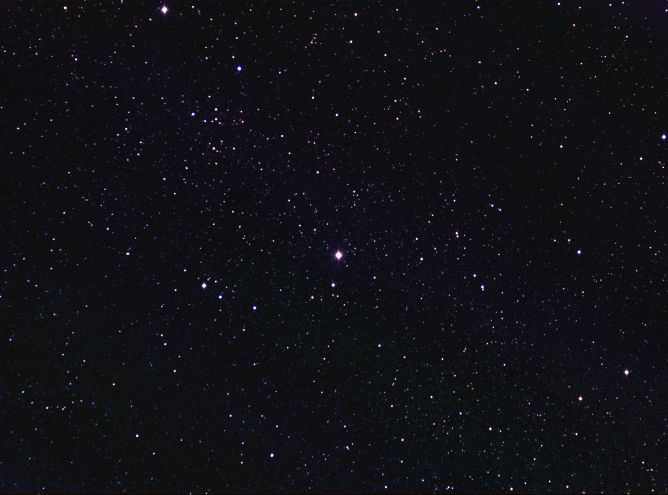
|
Credit & Copyright: John Chumack
Explanation:
This pretty star field in the constellation
Ophiucus is
centered on a star not often seen - RS Ophiuci.
In fact, early last week
RS Oph suddenly became
visible to the naked eye for the first time since 1985.
A type of cataclysmic variable star
classified
as a recurrent nova, RS Oph
dramatically
increased in brightness from 11th
magnitude,
too faint to appear on some star charts.
Historically,
RS Oph was seen to go through only four
similar outbursts
since 1898.
Such stars are now
modeled
as interacting binary star
systems, composed of a compact white dwarf star co-orbiting
with a swollen red giant.
As material falls away from the red
giant it collects in a rotating accretion
disk before ultimately falling on to the white dwarf.
Disk instabilities, or a build up of material on
the compact star result in the occasional but rapid release of
energy through nuclear burning.
At an estimated distance of 3,000 light-years,
RS Ophiuci is
now reported to be fading rapidly.
This telescopic view spans about 2 degrees (4 full moons)
and was captured on the morning of February 16 from the
RAS Observatory
under New Mexico skies.
|
January February March April May June July August September October November December |
| ||||||||||||||||||||||||||||||||||||||||||||||||
NASA Web Site Statements, Warnings, and Disclaimers
NASA Official: Jay Norris. Specific rights apply.
A service of: LHEA at NASA / GSFC
& Michigan Tech. U.
Based on Astronomy Picture
Of the Day
Publications with keywords: nova - cataclysmic variable - white dwarf - red giant - binary star
Publications with words: nova - cataclysmic variable - white dwarf - red giant - binary star
See also:
- APOD: 2026 February 16 Á Unexplained Shocks Around a White Dwarf Star
- APOD: 2024 April 30 Á GK Per: Nova and Planetary Nebula
- The Bipolar Jets of KX Andromedae
- APOD: 2025 July 3 Á Nova V462 Lupi Now Visible
- APOD: 2023 December 24 Á NGC 2440: Cocoon of a New White Dwarf
- Explosions from White Dwarf Star RS Oph
- Perseid Meteor, Red Sprites, and Nova RS Oph
